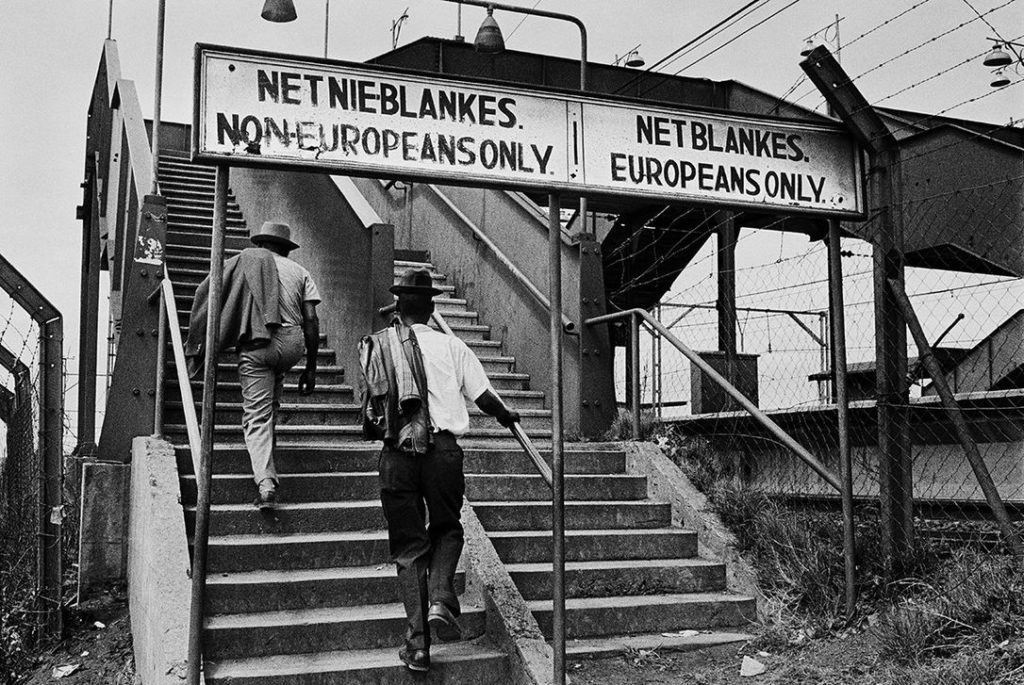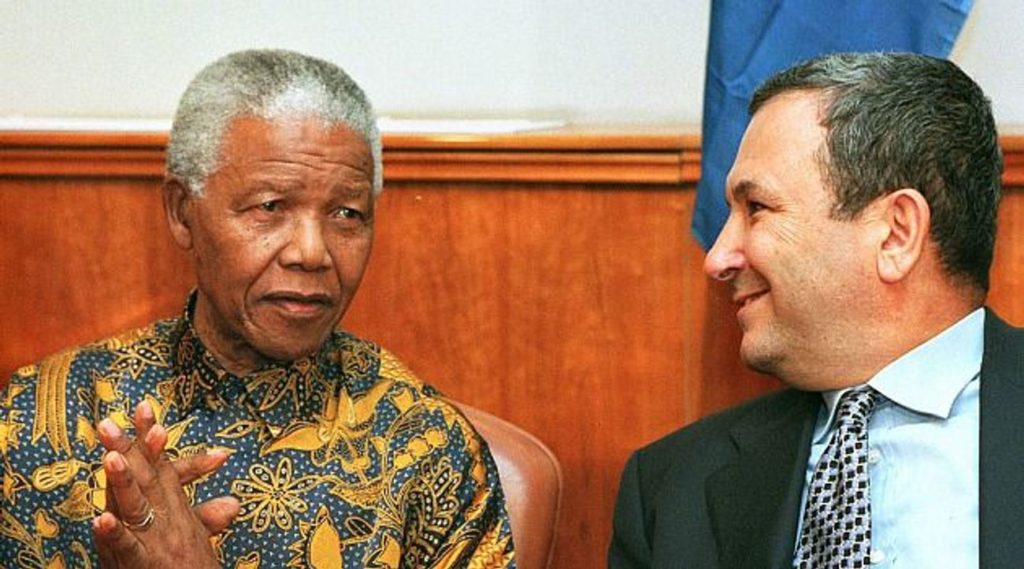Australia/Israel Review, Featured
Essay: The Apartheid Lie
Mar 30, 2020 | Olga Meshoe Washington

The appropriation of South Africa’s history
Imagine having your food served to you on a tin plate and not a normal ceramic one, because of the colour of your skin. Imagine having to use the designated, concealed back entrance of a public hospital to be checked by a doctor in a designated room, out of sight of other patients of a different race. Those are two of the many experiences my parents and millions of other black South Africans experienced during apartheid South Africa.
THE APARTHEID LIE
In recent years, the term “apartheid” has become so synonymous with the State of Israel that it has almost lost its original meaning: the policy of the South African regime from 1948 to 1994 that segregated and discriminated black South African citizens from white South African citizens. This regime was regulated and institutionalised by a system of over 150 codified laws. By law, black people were dispossessed of their land, homes, and livelihoods, and forcibly relocated to designated, under-developed areas. By law, we black South Africans were prohibited from using the same transportation system, attending the same public schools or enjoying the same public facilities as white South Africans. By law, we could not move freely within our own country and were not allowed to participate formally in the main economy of the country. We were denied the right to vote. We were forbidden from marrying the person we loved if he or she were of a different race group.
In addition, black people of different tribes were separated and grouped into mini-homelands to further strip us of our identity as black South Africans. Growing up in apartheid South Africa, I was told by white society that as a black person, I could dream only certain dreams; all others were reserved for white people.
The above descriptions of apartheid South African life are the antithesis of contemporary Israeli life.
In Israel, by law, Israeli Arabs have the same rights as Israeli Jews. They study in the same school system and are treated as equals to all other Israelis in the same hospitals. Israeli Arabs vote, are elected to the Knesset, and have become Supreme Court justices. Although not required to join the army, some Arab Christian and Muslim citizens of Israel choose to serve in the Israel Defence Forces. Israeli Arabs enjoy the same privilege as other Israelis to study for academic degrees at Israeli universities of their choice.
Palestinians who live in east Jerusalem also enjoy this privilege, despite not being Israeli citizens. Buses and trains are open to all; they do not have signs saying “Jews only” or “Arabs only” to separate commuters, as was the case in South Africa.
Some argue that Israel’s Nation-State law (formally titled Basic Law: Israel as the Nation-State of the Jewish People) adopted by the Israeli Knesset on July 18, 2018, which legally enshrines Israel as the nation-state of the Jewish people, confirms Israel’s “apartheid” character.
However, it does not impact or detract from the existing rights to equality and dignity of all Israeli citizens which remain enshrined and protected in Israel’s Basic Law: Human Dignity and Liberty. The Nation-State law merely reaffirms Israel’s Jewish majority character and underlying Zionist founding principles, the very reason for its modern creation as the democratic nation-state of the Jewish people.
Israel’s Jewish character was recognised and validated by the League of Nations in 1922, its successor organisation the United Nations in 1945, and again upon Israel’s acceptance as a formal member of the United Nations in 1949.
Just as Japan is the homeland of Japanese people and France is the homeland of French people, Israel is the homeland of Jewish people. The existence of these sovereign countries as homes for their respective peoples is not discriminatory in nature. Of all these nations, and so many others in the 193 member states of the United Nations, Israel is the only nation accused of being an apartheid state. This malevolent double standard constitutes antisemitism according to the internationally accepted 2016 International Holocaust Remembrance Association working definition of antisemitism.
Despite being a Jewish State, Israel’s population is comprised of approximately one-quarter Muslims and it is the only state in the Middle East in which other religions, such as Christianity, not only coexist with Judaism but are thriving.
Israeli Jews themselves are of more than one colour; more than half of the Israeli Jewish population are descendants of immigrants from North African and Middle Eastern lands. Jews from India, China, and South America also call Israel home. Said differently, the majority of Israel’s population is non-white.
THE PEDDLING OF AN ANTISEMITIC LIE
Anti-Zionists often refer to the late former president of my country, Nelson Mandela, as an authoritative validator of the apartheid lie. One of the most used quotes from Nelson Mandela for this purpose is, “We know too well that our [South Africa’s] freedom is incomplete without the freedom of the Palestinians,” from his speech given on the International Day of Solidarity with the Palestinian People in 1997.

Nelson Mandela in Israel with Ehud Barak in 1999
What is not told is that Mandela visited Israel in 1999, something those who perpetuate the apartheid narrative do not want the world to know. On this visit, Mandela said, “I cannot conceive of Israel withdrawing [from territory] if Arab states do not recognise Israel within secure borders.” This is a Zionist statement. While Nelson Mandela was pro-Palestinian, he was not anti-Israel.
In addition to dishonestly misrepresenting the positions of authoritative and respected individuals such as Mandela to underpin their deceptive narrative, information sites aimed at journalists are often guilty of furthering the apartheid narrative.
For instance, the Institute for Middle East Understanding (IMEU) is a self-described resource hub for journalists seeking information on the socio-economic, political, and cultural aspects of Israel (which it calls ”Palestine”) and Palestinians, for purposes of educating the general public. Despite touting itself as an independent non-profit organisation, IMEU describes Israel as an “occupier” that engages in “ethnic cleansing” in Jerusalem. It also nefariously ascribes Israel’s administration of the West Bank, the result of a bi-lateral diplomatic agreement with the Palestinian Liberation Organisation and which was internationally witnessed and guaranteed by the Oslo Interim Accords in 1995, as the basis for Israel being an apartheid state.
The Oslo Interim Accords divided the West Bank into three zones. Depending on the zone, Israel or the Palestinian leadership was assigned all, some, or no civil and security jurisdiction of the zone in question. Not only is it factually incorrect and dishonest to describe Israel’s civil and/or security administration of the zones, per the Oslo Accords, as “apartheid”, it is a deliberate omission and distortion of history.
It is true that racism exists in Israel. Racism also exists in mature democracies such as the United States and Great Britain. It also exists in today’s democratic South Africa. If the United States, Great Britain, or South Africa are not described as an apartheid state, it begs the question why Israel is singled out as being an apartheid state because racism can be found within it.
A COLONIAL-SETTLER STATE?
What of the argument that Israel is a colonial-settler state? That question may be answered by another: can a native become a settler?
From as far back as the second millennium BCE, there has always been a significant Jewish presence in the land, which comprises the modern state of Israel, Gaza, and Judea and Samaria – the disputed territories of the West Bank. Historical data and archaeological artifacts testify to the existence of Jewish culture, politics, and an economy for the past 3,000 years. These demonstrate that Jews are the indigenous people of the land. The immigration of Jews from across the world to the State of Israel does not equate to the increasing occupation of dispossessed land by the dispossessors, but the return of the indigenous people to their homeland. This homeland includes east Jerusalem and west Jerusalem. Indigenous people cannot be settlers. The Jews are not settlers. Israel is not a coloniser.
Calling Israel a colonial-settler state is an insult to every African nation that was a victim of colonialism. It also dismisses the fact that the economic and political instability that characterises much of Africa today owes most of its existence to Europe’s egregious colonisation of all but two African nations.
THE TRUE COST OF THE ISRAEL APARTHEID NARRATIVE
Lies empower evil. Lies about blacks empowered apartheid in South Africa. Lies about Jews made the Holocaust possible.
With all its imperfections, Israel is not an apartheid state. This false claim masks the true antisemitic intentions of those who call Israel an apartheid state. It has misled many well-intentioned people around the world into opposing the only true democracy in the Middle East.
This apartheid lie continues to embolden antisemitic acts on innocent Jews in the privacy of their homes, during their times of worship, and on university campuses. It odiously characterises non-Jewish Zionists and supporters of Israel as accomplices of Israel’s fictitious crimes against humanity. More importantly, it compromises the chances of peace in the Middle East.
Equally important but oftentimes forgotten, the apartheid label assigned to Israel redirects focus away from holding the Palestinian Authority and Hamas accountable for their ill-treatment and abuse of the Palestinian people.
DISHONOURING SOUTH AFRICA AND SOUTH AFRICANS
Calling Israel an apartheid state trivialises the humiliation and injustices endured by black South Africans who lived through apartheid and who still, together with their children and grandchildren, bear the scars of its legacy. If black South Africans enjoyed the rights enjoyed by Israeli Arabs, there would have been no need for South Africa’s liberation movement. There would not have been a Nelson Mandela, as the world knows him, or other freedom fighters who spent much of their lives incarcerated, and whose families sacrificed much for the democracy South Africa enjoys today.
It is thus morally repugnant for any person, any organisation, or any government to incorrectly appropriate South Africa’s apartheid history to apply to Israel. It is also repulsive to rally people across the world on the painful, collective, real experiences of black South Africans for a cause premised on falsehood.
Black South Africans must declare that their moral authority on what apartheid is and what it is not cannot be bought; that their history cannot be manipulated to perpetuate a narrative that erases the boundary between legitimate criticism of policies of the Israeli government and antisemitism.
It is incumbent upon all persons who genuinely desire to see peace in the Middle East and who have a sincere interest in the liberation of the Palestinian people from their oppressive leaders, to seek the truth and speak the truth against a narrative that is the core of an agenda to delegitimise, demonise, and ultimately destroy the State of Israel and Jewish life in the diaspora.
Olga Meshoe Washington, Adv., is an attorney, corporate consultant, and CEO of DEISI, Defend Embrace Invest Support Israel. This essay was initially published as a chapter in the book Israelophobia and the West: The Hijacking of Civil Discourse on Israel and How to Rescue It, edited by Dan Diker and published by the Jerusalem Centre for Public Affairs (JCPA). © JCPA (www.jcpa.org), reprinted by permission, all rights reserved.
Tags: Anti-Zionism, Apartheid, Israel, Palestinians, South Africa






